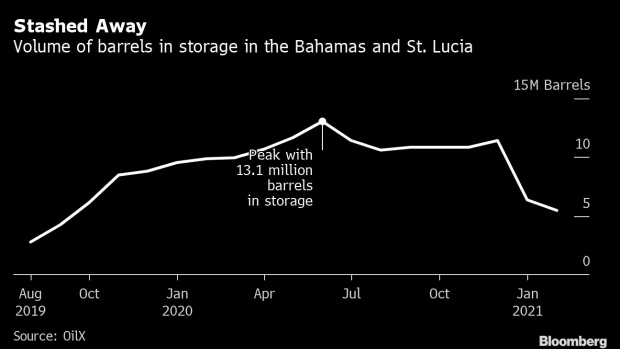Mar 12, 2021
Oil’s Dramatic Recovery Comes to Life in Caribbean Storage Tanks
, Bloomberg News

(Bloomberg) -- For evidence that OPEC+’s strategy is working, consider what’s happening within the massive oil tanks dotting the Caribbean islands.
Since Saudi Arabia stunned the global oil market with a large cut in crude production in January, traders have been draining crude supplies from St. Lucia and Freeport in the Bahamas to capitalize on the nearly 35% surge in crude prices. Inventories in the region are now at a 17-month low and less than half the peak reached in June, according to industry data-analytics firm OilX.
The rapidly depleting inventories in the Caribbean -- which serves a sort of transfer station for the world’s oil markets -- illustrate how staggering the turnaround in crude prices has been. Nearly a year ago as demand was plummeting because of the pandemic, Saudi Arabia and Russia kicked off a petroleum price war that resulted in oil futures falling below zero. The market moved into a state of contango, when prices in the near term are lower than those out into the future, and traders frantically searched for tanks to stockpile crude as they waited for a recovery.
Now, oil markets are in deep backwardation because of OPEC+ stunning decision earlier this month to maintain production cuts. Brent oil for prompt delivery traded at 63 cents a barrel above that for delivery another month out, more than double what it was at the beginning of February. As a result, traders in the Americas are removing barrels from storage a month or two earlier than expected, according to people with knowledge of the situation.
The depletion of inventories extends beyond the Caribbean. In Central America, Panama’s Pacific terminal of Charco Azul used by Chinese and U.S. West Coast refiners experienced a similar phenomenon after tankers removed 8 million barrels last month, a 33% increase from January, data compiled by Bloomberg show.
The outflow is happening so rapidly that it is contributing to a lull in demand for physical crude from the North Sea and West Africa, the people said. The pace of drawdowns is expected to accelerate in coming weeks with U.S. Gulf refiners continuing to ramp up operations following the freezing temperatures that hit Texas in February while Asian refiners are set to emerge from planned maintenance.
©2021 Bloomberg L.P.


